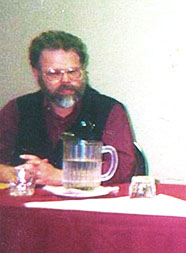On Conventions
by Mel Gilden
I like to attend literary conventions and would go to a lot more if I had the time and money. These little three and four day affairs are events outside time, not really part of our universe at all. Instead of worrying about money, the job, the homework, or family matters, one is more likely to be concerned with who to have lunch with, which panel to visit, or how to approach one's favorite author.
Though it has grown larger over the years, LosCon was originally conceived of as a small local science fiction convention. As such, attending can be a very rewarding experience for a small local author such as myself. I am always surprised at the number of people, many of whom I do not know, who greet me by name and tell me they like my work. (This year I ran into a gentleman from England who not only said he'd read me, but owned some of the books I'd written. Meetings like this are particularly gratifying. My books have been to England even if I have not!)

Speaking on panels is fun too because I get to sound off about subjects I fancy I know a little about: Star Trek, animation writing, mystery/fantasy combinations, how to write, how to sell. Because there are usually at least four speakers on a convention panel I don't feel the pressure to be quite as prepared as I might be if I were the only lecturer in a classroom. Also, the audience is usually made up of people who are really interested in the subject; many of them will explain their own viewpoints and philosophies as well as ask question.
(Some years ago I arrived late to be on a two person panel about Star Trek. By the time I got there the other panelist was holding forth at length. At one point he mentioned that he had never actually seen a Star Trek episode. He not only continued holding forth, but the members of the audience continued to sit in place and listen to him. I never understood why he was on that panel or why anybody would listen to him.)
Of course, there are more important professional reasons for attending conventions, many of them having to do with publicity — a particularly important problem to those of us who are attempting to sell books without the backing of a traditional publisher. Just showing up at a convention will do some good because readers like to meet the writers they like. Even having a short conversation in the hallway can be the best kind of public relations. Of course it does no harm to talk up my books on panels and at my autographing session. And having informational flyers available is useful too.
Writing fiction is one of the loneliest jobs there is. A convention can relieve the unpleasant feeling that even the stories and books that have been published are being sent directly to a pulp mill somewhere. The idea that someone is actually reading your stuff is refreshing and encouraging.